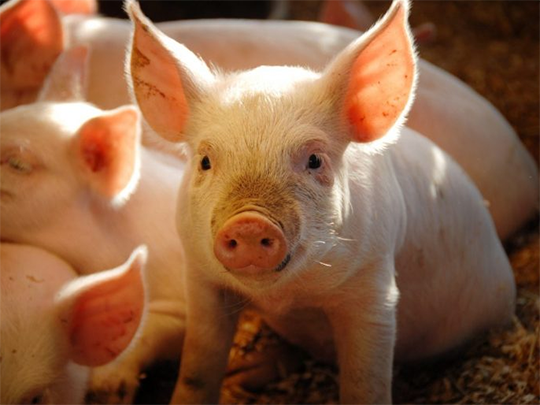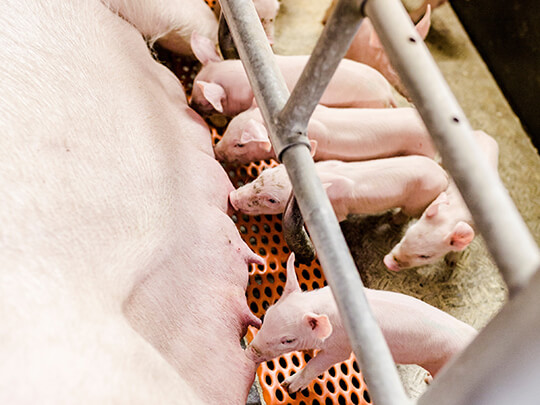Phytogenics as natural performance enhancers in pigs?
Have you ever tried natural performance enhancers in pigs, like phytogenics? In this article you can read about the beneficial effects of using phytogenics in piglets and growing-finishing pigs….
After reading the article you will know about...
- the beneficial effects of phytogenics for piglets and growing-finishing pigs
- why phytogenics can provide a valuable tool in antibiotic-free animal production
- why assorted phytogenic feed additives are also known as natural performance enhancers
How can intensive animal production ensure animal health, productivity and profitability in this new era? How to sustain animal production without antibiotics? Which are the alternatives for antibiotic growth promoters? – The topic among the numerous professionals involved in livestock production nowadays is always the same.

Phytogenics – plant-derived bioactive substances with proven effects - are able to support profitable pig production.
Their potential as natural performance enhancers in pigs has been demonstrated as the animal’s feed intake is stimulated. Efficient digestion and nutrient absorption results in better growth performance and improved feed conversion ratio. In this new agricultural reality, phytogenics are a valuable tool to support sustainable and antibiotic-free animal production.
Discovering the broad potential of phytogenics
Humans have explored nature for centuries, discovering various plant-based active substances and improving their knowledge. Nature reveals a broad spectrum of bioactive plant components for the most diverse areas of application. Scientific knowledge allows us to identify, characterise and standardise phytogenic (plant-derived) bioactive compounds. In addition to an increase in palatability, scientific studies have shown that phytogenics (like spices, herbs, essential oils etc.) have other extraordinary properties, such as antioxidant, anti-inflammatory or growth-promoting effects.
Did you know?
Delacon, an expert in phytogenic feed additives (PFAs), has coined the term phytogenics, nowadays accepted, recognised and widely used for plant-based feed additives.
Reducing antibiotics in animal production is a challenge
Reducing the use of antibiotics in animal production is a challenge that strongly involves all the players. It requires holistic approaches – there are no patent remedies or “one fits all” solutions, as each farm is unique with its opportunities, specificities and weaknesses. Proactive approaches are necessary: Starting with the reduction of disease pressure and extending to feed and nutrition strategies aimed at strengthening the resilience of the animals. Since economic viability is the ultimate goal, high productivity and performance must be achieved while taking animal welfare and well-being into account. What about natural performance enhancers in pigs?
Phytogenic support begins with the piglet
Specifically formulated phytogenics have shown that they can support the piglet during the difficult period after weaning. The most important advantage of phytogenics is their taste-enhancing property: although the weaning process normally starts with a decrease in feed intake, a trial in Belgium showed an increase of 4.9% in average daily feed intake and an increase of 4.8% in average daily gain by the addition of a phytogenic feed additive, adapted to the specific needs of piglets after weaning (Figure 1 & 2). In addition to adequate feed intake, feed conversion and nutrient uptake allow the piglet to maintain stable intestinal integrity and function.
Healthy pigs perform at their best
Phytogenics are a valuable tool for maintaining daily weight gain and feed efficiency – enabling healthy animals to perform at their optimum level as they enter the growing-finishing phase.
It needs natural performance enhancers in pigs
As feed costs in the rearing and finishing phase (20-115 kg body weight) account for up to 70% of total production costs, improving feed digestibility and feed conversion efficiency can increase pig profitability.

Fresta F for pig performance
Did you know that Fresta® F is Delacon’s second phytogenic feed additive approved as a zootechnical additive? Fresta® F, which is aimed at piglets, was the first phytogenic feed additive to get an approval under that functional category in 2012.
Assorted phytogenics can help to increase feed digestibility by stimulating the secretion of digestive enzymes, thereby optimizing nutrient uptake. In addition, research has shown that ammonia emissions can also be minimized by selected phytogenics, by reducing nitrogen excretion and inhibiting ammonia formation. This can reduce the negative effects of ammonia emissions on the environment and the harmful effect on the respiratory epithelium of animals and workers.
References from the author upon request
You want to have more informations about phytogenics in pigs?

Sandra Chamusco
Global Technical Manager Swine at Delacon Sandra Chamusco has a degree in Animal Science at the University of Évora in Portugal and has been working in swine nutrition for more than 20 years. She was a feed formulator and customer consultant, technical responsible and Director of Operations at the Portuguese subsidiary of the French group CCPA. After that she was Director of Swine Nutrition Department at T.N.A. (Portugal). At Delacon,Sandra is responsible for product development and product support, and for the customer technical services for the complete range of Delacon’s swine products on a global level.










